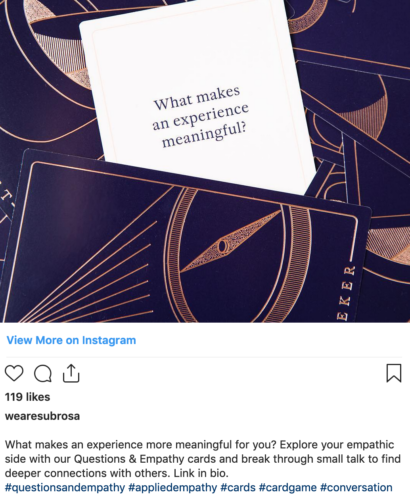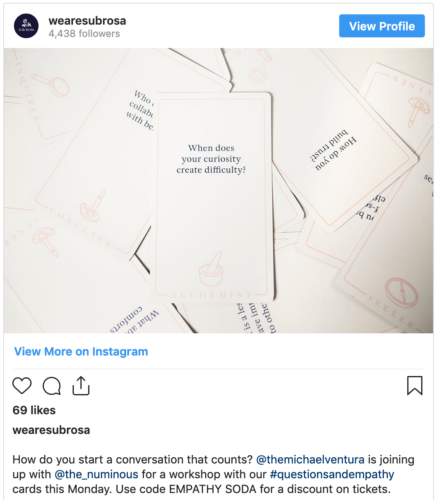
[Source Image: Abidal/iStock]
https://www.fastcompany.com/90461985/inside-the-big-messy-business-of-empathy
“In my view, if empathy becomes ubiquitous, that’s probably not going to be a bad thing for anybody,” Sub Rosa’s Ventura said.
On a Monday afternoon in late fall of 2018, a group of 30 or so adults in various interpretations of business-casual sat in neat rows of chairs facing a projector screen with the words “Applied Empathy” written across it. They had arrived minutes earlier, lanyards in tow, at the spacious West Village event room of Sub Rosa, a creative marketing agency whose clients include Pepsi, General Electric, and Nike, for a workshop on how to bring more empathy into their work.
At the front of the room, Sub Rosa’s founder and CEO, Michael Ventura, stood before the glowing screen. Tall with long dark hair, a beard, and fashionably casual clothes, he exuded a kind of urban shaman vibe.
As one of the Fast Track sessions at the Fast Company Innovation Festival, the 90-minute workshop promised to introduce attendees to Sub Rosa’s Applied Empathy methodology, a corporate leadership approach designed to “drive internal cultural change, build better products, and connect [businesses] more deeply with [their] audiences.”
Ventura authored a book titled Applied Empathy and designed an Applied Empathy card game called Questions & Empathy that he describes as “a highbrow Cards Against Humanity—it escalates you from small talk to big talk ultra fast.”

Ventura started the session with a vocabulary lesson. “I’ll begin by asking a fairly obvious question that we often ask ourselves: Why empathy?” he said, as attendees dug through their bags for a pen to take notes.
Empathy, he continued, is a chronically misunderstood term, particularly in the business world. “People think empathy is about being nice, being compassionate, being sympathetic—it’s none of those things,” he said.
At Sub Rosa, he explained, empathy has a broader meaning that extends well beyond its dictionary definition of “the ability to understand and share the feelings of another.”
“We say empathy is self-aware perspective-taking to gain richer, deeper understanding,” he said. And all the niceties he mentioned before?
Those are simply the side effects of being a more empathetic person. For companies like Sub Rosa that position themselves as design-centric problem-solvers, developing a deeper understanding of their clients—or of their clients’ clients—has very real economic benefits. It can lead to more impactful campaigns and more memorable brand activations. It can produce more useful products and solve overlooked needs.
Posted at GoodNewsNetwork: You Can Now Send Compassionate Texts to Random Strangers—And Get Them in Return—Thanks to New Project
According to an organization called The Empathy Business, empathy is a quantifiable metric.
In 2015 and 2016, the UK company released an Empathy Index, which ranked the top 100 companies based on an analysis of corporate culture, ethics, leadership performance, social media presence, and brand perception.
Businesses can be good or bad at empathy, but the company argues that those who build an empathetic culture can see real economic benefits (Facebook ranked first in 2016, so take from the index what you will). “The top 10 companies in the Global Empathy Index 2015 increased in value more than twice as much as the bottom 10, and generated 50% more earnings,” Belinda Parmar, founder of The Empathy Business, wrote in the Harvard Business Review in 2016.
Another online report from the human resources startup Businesssolver found that in 2019, 91% of CEOs surveyed said they believe a company’s financial performance is tied to empathy in the workplace, adding that empathy can motivate employees and improve productivity.

Back at the workshop, Ventura instructed the crowd to split off into pairs of strangers. Each attendee was armed with two tarot-style cards printed with probing questions like “What questions make you most uncomfortable?” or “What motivates you to progress?” Ventura set a timer for 10 minutes, and the room lit up with quiet conversations that cumulatively produced an echoing boom.
The woman I was partnered with told me that her marketing team at a global consumer brand had been having trouble communicating. People were stressed and stretched too thin. There was no time for taking stock of her team’s mental health. She said she wanted to be able to apply the same level of care and empathy she feels in her personal life to her work life—and that it was, frankly, really hard.
Fast Company: Snapchat Introduces New Interventions for Mental Health
The conversation felt a little weird and forced, but it also worked. Despite knowing only her first name, I felt like I learned more about her outlook on work than I’ve learned about many of my friends.
“It’s really beautiful to see a room shift like that,” Ventura said at the end of the exercise. When it works, he continued, empathy can get people to open up—even with perfect strangers.
“Quick show of hands,” he said, ready to prove his point. “How many of you have these kinds of conversations with your colleagues?”
No one raised their hand.

